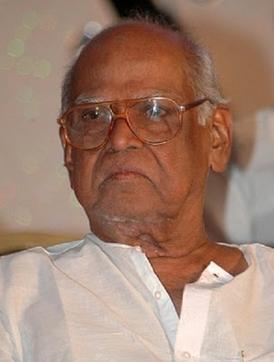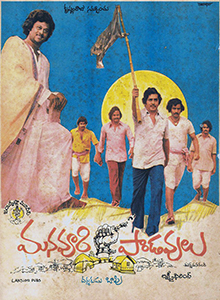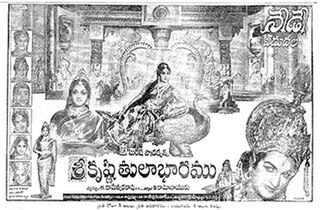Related Research Articles

Rukmini is a Hindu goddess and the first queen of Krishna. In Vaishnavism, she is described as Krishna's principal queen as well as the chief of his wives in Dvaraka. In scriptures, Rukmini is regarded as an avatar of Lakshmi and is the goddess of fortune. Rukmini is venerated primarily in Warkari, and Haridasa tradition, and additionally in Sri Vaishnavism.
Srirangam Srinivasa Rao, popularly known as Sri Sri, was an Indian poet and lyricist who is known for his works in Telugu literature and films. Noted for his anthology Maha Prasthanam, Sri Sri is a recipient of a National Film Award, a Nandi Award and a Sahitya Akademi Award.

Sattiraju Lakshminarayana, known professionally as Bapu, was an Indian film director, painter, illustrator, cartoonist, screenwriter, music artist, and designer known for his works in Telugu cinema, and Hindi cinema. In 2013, he was awarded the Padma Shri, for his contribution to Indian art and cinema. He has garnered two National Honors, two National Film Awards, seven state Nandi Awards, two Filmfare Awards South, a Raghupathi Venkaiah Award, and a Filmfare Lifetime Achievement Award – South.

Nyctanthes arbor-tristis is a species of Nyctanthes native to South Asia and Southeast Asia. It is commonly known as night-blooming jasmine, tree of sadness, tree of sorrow, hengra bubar, coral jasmine and in Singapore seri gading. Despite its common name, the species is not a "true jasmine" and not of the genus Jasminum.

Ashtadiggajas is the collective title given to the eight great Telugu scholars and poets in the court of Emperor Krishnadevaraya, who ruled the Vijayanagara Empire from 1509 until his death in 1529. During his reign, Telugu literature and culture reached its zenith. In his imperial court, these eight poets were regarded as the eight pillars of his literary assembly. The age of Ashtadiggajas is called the Prabandha Age. Each Ashtadiggaja had composed at least one Prabandha Kavyamu, and it was the Ashtadiggajas who gave Prabandha its present form. Most Ashtadiggajas were from Rayalaseema. The Ashtadiggajas Allasani Peddana, Dhurjati, Nandi Thimmana, Madayyagari Mallana and Ayyalaraju Ramabhadrudu were from Rayalaseema. Pandit Ramakrishna hailed from Tenali in the Guntur district of Andhra Pradesh. Ramarajabhushanudu and Pingali Surana were the other two Ashtadiggajas.

Manavoori Pandavulu is a 1978 Indian Telugu-language film directed by Bapu and written by Mullapudi Venkata Ramana, dealing with the struggle against the feudal system in their own unique way. The film is remake of Kannada film Paduvaaralli Pandavaru (1978) directed by Puttanna Kanagal. In 1980, he also remade it in Hindi as Hum Paanch starring Mithun Chakraborty.

Telugu theatre is Indian theatre in the Telugu language, based in the states of Andhra Pradesh and Telangana. Gurajada Apparao wrote the play, Kanyasulkam in 1892, which is often considered the greatest play in the Telugu language. C. Pullaiah is cited as the father of Telugu theatre movement.

Pelli Pustakam is a 1991 Telugu-language romantic comedy film, produced by Mullapudi Venkata Ramana under the Sri Seetarama Films banner and directed by Bapu. It stars Rajendra Prasad, Divyavani and music composed by K. V. Mahadevan. The film won three Nandi Awards, and was premiered in Indian Panorama section at the International Film Festival of India. This movie has a resemblance to the 1955 classic movie Missamma.

Gollapudi Maruti Rao was an Indian actor, writer and director known for his works in Telugu cinema, Telugu theatre and Telugu Literature. Rao acted in over 250 Telugu films in a variety of roles. His noted literary works and plays, like Rendu Rellu Aaru, Patita, Karuninchani Devatalu, Mahanatudu, Kaalam Venakku Tirigindi, Aasayaalaku Sankellu, won numerous State Awards.

Mahakavi Kshetrayya is a 1976 Telugu-language biographical film, based on the life of Kshetrayya, produced by P. Adinarayana Rao under the Anjali Pictures banner and directed by Adurthi Subba Rao & C. S. Rao. It stars Akkineni Nageswara Rao in the title role, with Anjali Devi, Manjula as female leads, and music also composed by P. Adinarayana Rao. Actually the film direction was started by veteran Adurthi Subba Rao but he had expired in the middle of the movie and director C. S. Rao completed the movie.

Sri Krishnarjuna Yuddhamu is a 1963 Indian Telugu-language Hindu mythological film, produced and directed by K. V. Reddy under the Jayanthi Pictures banner. It stars N. T. Rama Rao, Akkineni Nageswara Rao and B. Saroja Devi, with music composed by Pendyala Nageswara Rao. The film was based on the Telugu play Gayopakhyanam written by Chilakamarti Lakshmi Narasimham in 1890. It was later dubbed into Kannada and into Tamil.

Kalyanam Raghuramaiah (1901–1975), popularly known as Eelapata Raghuramaiah, was an Indian actor, and thespian known for his works in Telugu cinema, and Telugu theatre. A recipient of the Sangeet Natak Akademi Award, and the Padmashri, He was known for the roles of Krishna or Dushyantha, Bhavanisankar, Narada etc. He performed those roles for about 60 years. He indulged in elaborate raga alapana, based on different ragas while rendering padyams.

Sri Krishna Satya is a 1971 Indian Telugu-language Hindu mythological film directed by K. V. Reddy. It stars N. T. Rama Rao and Jayalalithaa, with music composed by Pendyala. The film was produced by N. Trivikrama Rao. It was the last film directed by the noted filmmaker K. V. Reddy.
Jandhyala Papayya Sastry was an eminent Telugu writer and lyricist. He was popularly known as Karunasri because his writings expressively show compassion, one of the nine Rasas. His famous kavyas include Pushpa Vilapam and Kunthi Kumari.

The Ashtabharya or Ashta-bharya(s) is the group of eight principal queen-consorts of Hindu god Krishna, the king of Dvaraka, Saurashtra in the Dvapara Yuga (epoch). The most popular list, found in the Bhagavata Purana, includes: Rukmini, Jambavati, Satyabhama, Kalindi, Nagnajiti, Mitravinda, Lakshmana and Bhadra. Variations exist in the Vishnu Purana and the Harivamsa, which includes queens called Madri or Rohini, instead of Bhadra. Most of them were princesses.

Sri Krishna Vijayamu is a 1971 Indian Telugu-language Hindu mythological film produced by M. S. Reddy under the Kaumudi Art Pictures banner and directed by Kamalakara Kameswara Rao. It stars N. T. Rama Rao and Jayalalithaa, with music composed by Pendyala Nageswara Rao. The film was recorded as a flop at the box office. It was dubbed into Hindi as Hare Krishna in 1974.

Paruchuri Gopala Krishna is an Indian screenwriter, actor, and director known for his works in Telugu cinema. Gopala Krishna is the younger of the Paruchuri brothers, a writing duo in the film industry who have worked on more than 350 Telugu films since 1978.

Sri Krishna Tulabharam is a 1966 Indian Telugu-language Hindu mythological film, produced by D. Ramanaidu under the Suresh Productions banner and directed by Kamalakara Kameswara Rao. It stars N. T. Rama Rao, Anjali Devi, Kanta Rao and Jamuna with music composed by Pendyala Nageswara Rao.
Maddali Usha Gayatri is an Indian Kuchipudi exponent, danseuse, guru and choreographer from the state of Andhra Pradesh. A recipient of Hamsa Award and Sangeet Natak Akademi Award, she received critical acclaim for her choreography and performances. She performs ballets in mythological, historical and social themes. One of her works, Nrityam Darsayami, included a troupe of 12 of her disciples performing for 12 hours uninterruptedly.

Sri Krishna Tulabharam is a 1935 Telugu-language Hindu mythological film directed by Mukherjee and Rajaram and produced by Calcutta Kali Film Company. The screenplay, adapted by Mutharaju Subba Rao, is based on the Tulabharam episode from the Mahabharata involving Lord Krishna and Satyabhama. The film stars Kapilavayi Ramanadha Sastry, Jayasingh, Rushyendramani, Kanchanamala, Lakshmirajyam, and Relangi. It marks the on-screen debuts of Rushyendramani, Kanchanamala, Lakshmirajyam, and Relangi, and was filmed in Calcutta.
References
- ↑ "Telugu Literature". Archived from the original on 22 March 2014. Retrieved 21 March 2014.
- ↑ "పారిజాతాపహరణము". 1929.
- ↑ "పారిజాతాపహరణము". 1933.
- ↑ "పారిజాతాపహరణము". 1960.
- ↑ "పారిజాతాపహరణము". 1978.
- Rao, N. Venkata (1978). The southern school in Telugu literature. University of Madras. p. 10.